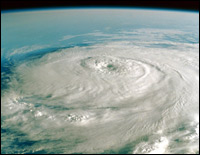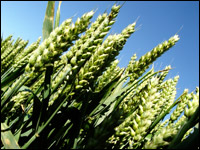climate change impacts
-
Portraits of loss in the wake of Katrina
On a misty November morning in 2005, I was photographing in New Orleans’ Ninth Ward neighborhood a few blocks from where one of the levees had failed 10 weeks earlier. Squatting in a driveway in foul-smelling mud, adjusting the knobs on my camera, I stood up to stretch my back and noticed a man sitting […]
-
Global warming could wipe out the bottom of the food chain.
 When you woke up this morning, did you thank [God, your lucky stars, the Big Bang] for plankton? If you didn't, consider adding it to your daily routine. Sure plankton are teeny-tiny and look like scary aliens, but they're also moderately important, in that sustaining-life sort of way.
When you woke up this morning, did you thank [God, your lucky stars, the Big Bang] for plankton? If you didn't, consider adding it to your daily routine. Sure plankton are teeny-tiny and look like scary aliens, but they're also moderately important, in that sustaining-life sort of way. Sadly, global warming could kill them off. The Independent wins my nomination for "Most Sinister Opening Paragraph o' the Day":
The microscopic plants that underpin all life in the oceans are likely to be destroyed by global warming, a study has found.
The article goes on to tell how this has "catastrophic implications" and is "potentially devastating," not just because the little critters are chow for bigger critters, but also because they absorb carbon dioxide in their wee bodies and take it with them when they die and sink to the ocean floor. Thanks for taking one for the team, plankton.
Of course this was entirely expected and scientists have been taking steps to resolve this imminent disaster, right? Uh, no.
Scientists had believed phytoplankton, which survives best at depths of about 100 metres, is largely stable and immune from the impact of global warming.
Whoops!
Without phytoplankton, the oceans would soon because marine deserts.
This is depressing, so I'm going to end this post with an exciting contest! Fun, fun! First person to name the band and song title of the following lyric wins a virtual high five from me!
"The ocean is a desert with its life underground, and a perfect disguise above."
Good luck!
-
Polar bears drowning
I thought this new Greenpeace commercial was kind of a cutesy joke. But no: Turns out polar bears really are drowning.
(Yeah, it's subscription only, so there's an excerpt below the fold.)
-
WSJ ranks island getaways by how they’ll hold during global warming
Power players in the U.S. are finally sitting up and taking note of climate change. But don't get hopeful just yet. They're not leaping to figure out how to retool our industrial system and stave off disaster. Rather, they're calculating which islands will make the best vacation getaways for the rich and famous in a globally warmed world.
Yes, The Wall Street Journal has helpfully published "The Global Climate-Change Island Guide" [subscribers only, alas], informed by the new "Dow Jones Island Index" [PDF; should work even for non-subscribers], which analyzes "12 factors that reflect a range of environmental risks that islands and island tourists face."
Of 40 islands examined, the top ranked for your continued vacation pleasure is Prince Edward Island off Canada's east coast. Of course, the average temperature in December is 24 degrees Fahrenheit, but maybe a little more warming will nudge that number up to a more comfortable range.
Elites will be more happy to see that Martha's Vineyard ranks second on the list. Also scoring reasonably well: the Florida Keys, Grand Cayman Island, and Crete.
Steer clear of Sri Lanka, though, which bottoms out the list. Other islands you might want to avoid: the Dominican Republic, Cuba, and Fiji.
Book those plane tickets and buy those third homes now, folks, before the plebs get ahold of this valuable data!
-
The environmental take on Hurricane Katrina
When Hurricane Katrina ripped through the Gulf Coast, it stirred up not just gale-force winds and untold misery, but a host of difficult environmental questions. How did heedless coastal development exacerbate the hurricane’s toll? What’s behind the socio-economic disparity in environmental planning — and emergency response to environmental disasters? Did global warming make the storm […]
-
Hurricane Katrina brings a foretaste of environmental disasters to come
If the images of skyscrapers collapsed in heaps of ash were the end of one story — the U.S. safe on its isolated continent from the turmoil of the world — then the picture of the sodden Superdome with its peeling roof marks the beginning of the next story, the one that will dominate our […]
-
A hurricane expert explains the climate-change connection
As the world watched New Orleans’ devastating descent into squalor last week, questions about connections between global warming and hurricanes reemerged. A few politicians and activists leapt to offer their views, most of which were unmeritorious. So what does the science say? Swifter, higher, stronger? Investigations of the climatology of tropical cyclones (the generic name […]
-
In a warmed world, even food won’t be as good for you
Humanity is on the threshold of a century of extraordinary bounty, courtesy of global climate change. That’s the opinion of Robert Balling, former scientific adviser to the Greening Earth Society, a lobbying arm of the power industry founded by the Western Fuels Association. In a world where atmospheric carbon dioxide levels soar from the burning […]
-
Bill McKibben sends dispatches from a conference on winning the climate-change fight
Tuesday, 25 Jan 2005 MIDDLEBURY, Vt. A crisp, cold, blue-sky New England day, fresh snow on the ground, and everything right with the world. Except that last night, as I was preparing to attend a three-day conference on climate change here in Middlebury, Vt., yet another disturbing report on global warming drifted across the net. […]

